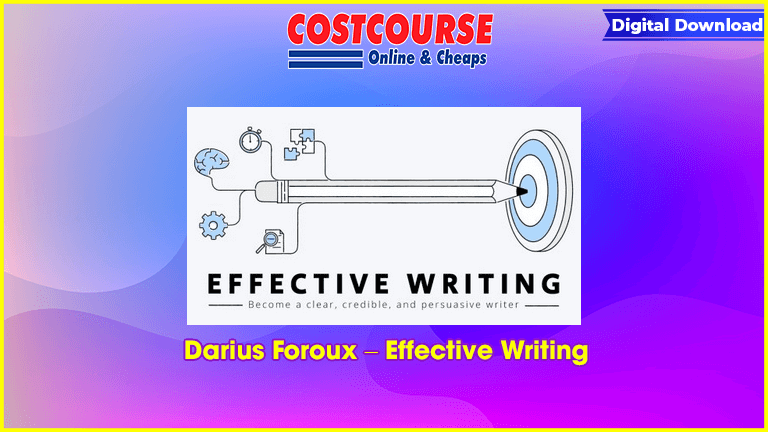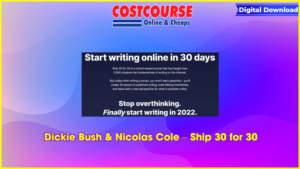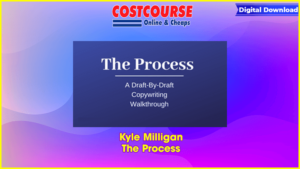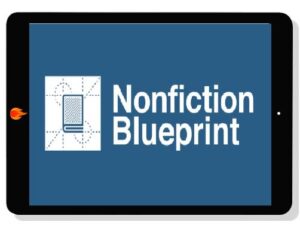Effective writing is the key skill for getting what you want in life
We live in a digital world, and we primarily communicate in the written word: Emails, job applications, business proposals, social media posts, presentations, sales pages like this one, you name it.
Darius Foroux – Effective Writing
After writing over 400 articles, building several businesses, reaching millions of readers, and talking to thousands of professionals and entrepreneurs; I’ve learned something.
We’re all writers now.
And yet, we do everything to not write. For years, I also thought I could get by without learning how to write effectively. But I realized that if I wanted to build a career, I couldn’t go around learning how to write in a way that resonates with readers.
Whenever I see people struggling with their careers, I’m reminded of a quote from the late William Zinsser, a former journalist of the New York Herald Tribune, and a professor at Yale and Columbia University:
| “People are prevented from doing useful work because they never learned to express themselves. Contrary to general belief, writing isn’t something that only “writers†do; writing is a basic skill for getting through life.â€
He’s right. We don’t fail in our careers because of a lack of effort, motivation, or grit—we fail because our words aren’t getting us the results we want.
Without knowing how to write effectively, we don’t know how to communicate, and therefore can’t get what we want. On top of that, good writing is a sign of credibility. When your writing is bad, you make it harder for people to take you seriously.
Introducing the Effective Writing system
Why isn’t everyone focusing on writing? Because we think writing is about perfect grammar or other things that don’t matter. You might write a grammatically sound sentence that completely misses the mark.
When you learn how to write effectively, you’ve hit gold. This is a skill that provides you value for the rest of your life. You can grow your career, and make an impact on other people’s lives.
Effective Writing gives you a failsafe system that shows you how to write in the following ways:
Clear: Think and write clearly so people will always understand you. Gone are the days when people have to ask, “What is this person trying to say?†Make people immediately understand what you really mean.
Credible: Be seen as an authority. You’re only effective as a writer if the reader believes you. But you can’t make the reader believe you. Your reader only believes you if your writing shows credibility without going overboard, and without forcing anything.
Persuasive: Get what you want with words. If you can write persuasively, you can get people to act, based on what you write.
Part 1: The 9 Rules of Effective Writing
The foundation of the Effective Writing system is based on 9 simple rules. This is what makes it a failsafe system.
Most people have trouble writing because they’re unsure about many things. But if you have these simple, straightforward rules to guide your writing, then everything becomes easier and less complicated.
Create a Genuine Writing Style—Courses and books always talk about writing style. But what is it? And how do you create a style that works, without trying too hard?
How To Write Clearly—You can lose reader interest, or fail to convince someone, if they get confused or don’t understand what you’re trying to say.
Cleaning Up Your Writing—Clutter is not only bad in your house, but it’s also bad in writing. Learn to get rid of it.
Keep Your Writing Simple—Many writers make their sentences too complicated. It might sound smart, but if the reader doesn’t get it, you’re missing the mark.
Use This To Make Your Writing More Powerful—Learn how to make your writing more concise, moving, and confident. It’s a sign of credibility.
Avoid This Common Mistake—I can’t give away too much here. But this mistake is often caused by the fear we all have that people won’t understand or believe our point.
Use Tense The Right Way—This rule is easily overlooked by many. But, grammar rules aside, using tense the right way improves the reading experience.
Drastically Reduce Confusion—If your readers often misinterpret or barely understand what you’re saying, or if you keep sending emails back and forth “for clarifications,†then you need this lesson.
The Impact of Consistency—Effective writing is consistent. But most of us tend to switch writing voices or styles. Learn how to overcome that tendency and write more efficiently.
The Only Grammar Rules You Need [NEW]—Most people aren’t fond of Grammar (me included). Fortunately, grammatically correct writing can be simplified.
The Style Of An Effective Writer [NEW]—You’ll learn how to tie everything together so your writing resonates with your readers.
Part 2: Tools of an Effective Writer
In the first module, you’ll learn the rules that guide you to write more effectively. Now, you’ll learn the key tools that will enhance your writing overall.
This module isn’t only about writing apps. As a writer, you can also rely on strategic tools that make the writing process easier, faster, and more productive.
How To Do Better Research—Writing is mostly about research. Once you change your perspective on writing, it becomes easier for you to write.
When You Should Edit—How do you go through your editing process? How do you edit, and when should you be doing that?
How To Make Your Writing Sound Good—You wrote something, but it just doesn’t sound right. It happens more often than you think. The fix is easy.
How To Use Journaling To Improve Writing—Here are several actionable tips to maximize the benefits you can get out of your journal.
An Exercise To Keep Writing—When you don’t know what to write about, you can rely on these prompts that can build up to a personal asset you can use in the future.
Best Writing Apps For Each Purpose [NEW]—In this lesson, I show my writing workflow, including all the apps I use.
Edit Your Writing To Make It Look Appealing [NEW]—How your writing looks matters just as much as what it’s trying to say.
How To Write Effective Headlines [NEW]—Your headlines are the first thing that people see, and they would only bother to read it if it inspires interest or curiosity in them.
Use This Tool To Improve Your Headlines [NEW]—You’ll learn how to maximize the impact of your headline, and make it more enticing to improve its chances of success.
How To Write a Call To Action [NEW]—CTAs are everywhere. At the end of emails, in business proposals, on websites, and even in messages. An effective CTA helps you get people to act.
Part 3: Getting the Results You Want
In the last module, we’ll tie everything together. You’ll learn how to practically apply the 9 rules of writing and combine them with the toolkits of an effective writer to get the results you want with your words.
This module shows you how to execute everything successfully.
Giving and Asking: Applying The Science Of Persuasion To Writing—We have to ask for things we want. But asking is difficult. Learn how to do it effectively.
Pitch Anything: A Strategy For Sending Cold Emails—Get your dream job, sell your products/services, get published in major publications, and more.
How NOT To Pitch—Are your pitches getting crickets? It’s not unusual. Here are some real-life bad pitches I’ve received over time, and how to avoid them.
“How Do You Overcome Writer’s Block?â€â€”Every writer experiences this. But you don’t have to. Here’s the mindset I use to never have writer’s block again.
Copywriting Lessons Everyone Can Use [NEW]—Learn the 6 copywriting rules that enhance the quality and impact of your writing.
How To Make Writing Personal [NEW]—When your writing feels personal, your words become very relatable, and you inspire your readers to act.
Tips For Writing Articles [NEW]—No one wants to write articles that nobody reads. Here are 6 tips to make your articles engaging and shareable for your readers.
Tips For Writing Books [NEW]— Have you always wanted to write a book? This strategy makes the book-writing process much easier and less daunting.
Connecting The Dots Of Effective Writing—We connect, apply, and execute the three parts of Effective Writing to achieve the results we want.








